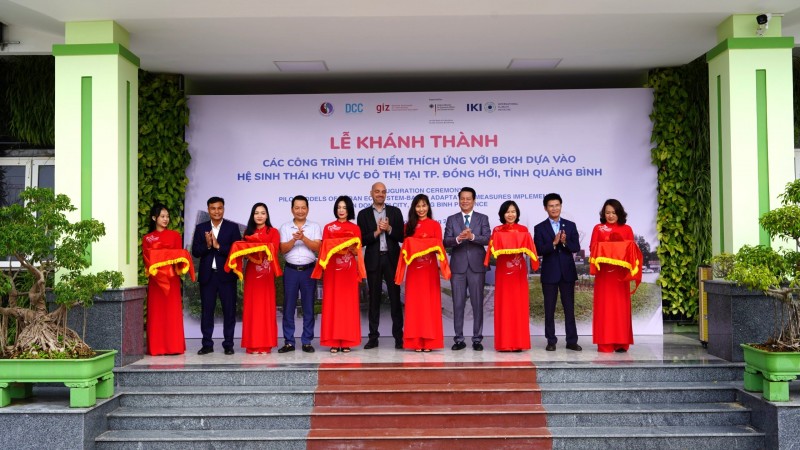
Germany supports development urban ecosystem-based adaptation in Quang Binh
Latest
 |
| The province of Quang Binh and the German Government inaugurated three models of urban ecosystem-based adaptation (EbA) measures in Dong Hoi City on February 10. (Photo: GIZ) |
The models including a building with "green walls and green roofs", a park with "sustainable urban drainage systems", and an intersection point with "water retention areas" were parts of the project “Support to Vietnam for the Implementation of the Paris Agreement” (VN-SIPA), funded by the German Government and carried by GIZ.
After nine months of construction from March 2022, the models have been completed and handed over to the city. Covered with green plants on the walls and the roof of Public Unit Buildinng, the ‘sustainable urban drainage systems’ changed an old rubbish space into a green park with an entertainment stage. The ‘water retention areas’ has made an intersection point as an undergrounn rainfall tank to reduce usally flood in the area.
Pham Van Luong, Deputy Director of Quang Binh Department of Natural Resources and Environment said that many people check-in at the new park and post on their Facebook, making it a famous site now. Luong added: “We expect all three models to be useful and practical. After evaluating the project, we are very satisfied with the result. We hope these measures will be replicated to other parts of the province too.”
Apart from the models, the project also carried out a capacity building programme for the local government staff so that they could plan and implement future measures in the coming time.
The capacity building programme were attended by about 100 officials and technical staff working in urban EbA and climate risk management at provincial and district levels. Additional trainings were held for more than 650 people from 10 communities in Dong Hoi City.
According to the provincial oficial, the project’s outcome helped raise public awareness about climate change, the potential of urban EbA and demonstrate the local authority’s commitment to strenghen urban resilience.
Due to specific geographical features in the centre of Vietnam with a long coastline, Quang Binh and other central coastal provinces often face with extreme weather such as drought, storms, flash floods, landslides, waterlogging and have been suffering badly from those.
Luong said: "With rising global temperatures, extreme weather is forecast to increase in the area, thus, the provincial adaptation to those problems is a need."
As Chief Technical Advisor of the IKI project VN-SIPA, Daniel Herrmann, said: “Cities along the coastline of Vietnam face the challenges of increasing typhoon and flooding as a consequence of climate change. The ecosystem based adaptation models implemented in Quang Binh are examples of how cities can prepare and adapt and as such mitigate the negative effects of climate change.”
He added: “The models chosen integrate nature based solutions and provide important co-benefits for biodiversity protection. The support to Dong Hoi through the International Climate Initiative intended to better equip the local government with the capacities to plan and identify urban adaptation measures to increase flood water absorption and demonstrate the feasibility and effectiveness of nature-based solutions for that purpose.”
He considered: “The successful models will have a lasting impact on the urban adaptation planning and help make Dong Hoi a more resilient and livable place.”
The VN-SIPA is funded through the International Climate Initiative (IKI) by the German Federal Ministry of Economic Affairs and Climate Action (BMWK) and implemented by the Deutsche Gesellschaft für International Zusammenarbeit (GIZ) GmbH, Department of Climate Change belonging to the Minitry of Nature Resource and Environment, and other stakeholders.
According to GIZ, its cooperation with Quang Binh in the fields can be considered a good example for a multi-stakeholder cooperation in ecosystem-based adaptation investments.
Daniel Herrmann added: "Improving the climate change adaptation of local people will also contribute to Vietnam Government's goal at COP26 as having net-zero by 2050."





















